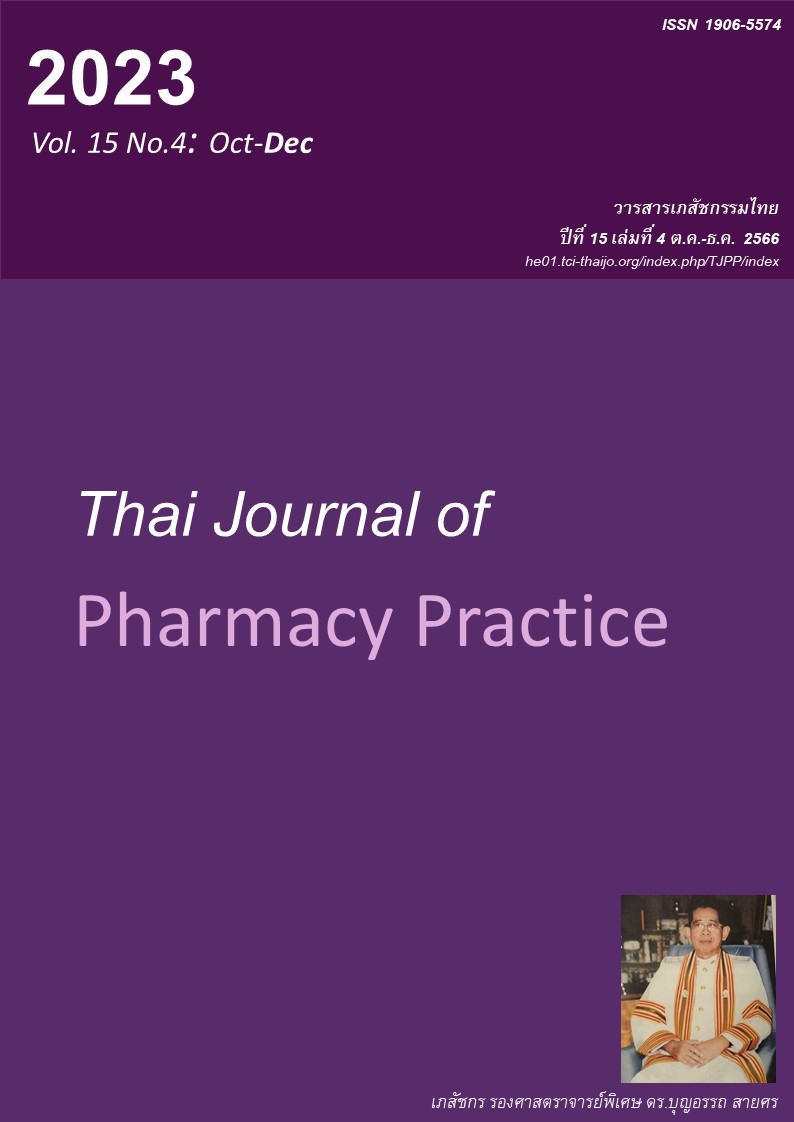การประเมินภาวะการรู้คิดบกพร่องในผู้ป่วยมะเร็งชนิดก้อนหลังได้รับยาเคมีบำบัด แบบเสริมในโรงพยาบาลสรรพสิทธิประสงค์ จังหวัดอุบลราชธานี
Main Article Content
บทคัดย่อ
วัตถุประสงค์: เพื่อศึกษาการเปลี่ยนแปลงของภาวะการรู้คิดในผู้ป่วยมะเร็งชนิดก้อนหลังได้รับยาเคมีบำบัดแบบเสริมในโรงพยาบาลสรรพสิทธิประสงค์ จังหวัดอุบลราชธานี และศึกษาปัจจัยที่สัมพันธ์กับการเปลี่ยนแปลงของภาวะการรู้คิดในผู้ป่วยกลุ่มดังกล่าว วิธีการวิจัย: การศึกษานี้เป็นการวิจัยโดยการสังเกตไปข้างหน้าในผู้ป่วยมะเร็งชนิดก้อนที่ได้ยาเคมีบำบัดแบบเสริม ณ หน่วยบริการผู้ป่วยนอกเคมีบำบัด โรงพยาบาลสรรพสิทธิประสงค์ ตั้งแต่วันที่ 28 กันยายน พ.ศ. 2564 ถึง 20 เมษายน พ.ศ. 2565 การศึกษาประเมินภาวะการรู้คิดด้วยแบบประเมิน FACT-Cog (Functional Assessment of Cancer Therapy - Cognitive Function) version 3 และประเมินภาวะวิตกกังวลและภาวะซึมเศร้าด้วยแบบประเมิน Hospital Anxiety and Depression Scale (HADS) การประเมินทำ 3 ครั้ง โดยครั้งที่ 1 เป็นการประเมินก่อนรับยาเคมีบำบัด (T1) ครั้งที่ 2 เป็นการประเมินหลังได้รับยาเคมีบำบัดในระยะเวลาครึ่งหนึ่งของรอบการรักษา (T2) และครั้งที่ 3 เป็นการประเมินหลังสิ้นสุดการรักษาด้วยยาเคมีบำบัด (T3) คะแนน FACT-Cog ที่ลดลงตั้งแต่ 10.6 คะแนนขึ้นไปเมื่อเทียบกับระดับที่เวลา T1 ถือว่าเกิดภาวะการรู้คิดบกพร่องที่มีนัยสำคัญทางคลินิก ผลการศึกษา: ผู้ป่วยเข้าการศึกษา 74 ราย อุบัติการณ์ภาวะการรู้คิดบกพร่องที่ T2 และ T3 เท่ากับ ร้อยละ 27.03 และ 52.54 ตามลำดับ ผู้ป่วยมีมัธยฐานของคะแนน FACT-Cog (พิสัยระหว่างควอไทล์) ลดลงอย่างมีนัยสำคัญทางสถิติ (P<0.05) จาก 120 (21) ที่เวลา T1 เป็น 114 (32) และ 110 (43) ในเวลา T2 และ T3 ตามลำดับ บ่งชี้ถึงความรุนแรงของภาวะการรู้คิดบกพร่องที่เพิ่มขึ้นภายหลังการรักษาด้วยยาเคมีบำบัด นอกจากนี้ยังพบความสัมพันธ์ระหว่างอายุที่เพิ่มขึ้นต่อคะแนนภาวะการรู้คิดที่ลดลง ณ เวลา T3 (P<0.05) สรุป: ผู้ป่วยมะเร็งชนิดก้อนที่ได้รับการรักษาด้วยยาเคมีบำบัดแบบเสริมมีอุบัติการณ์และความรุนแรงของภาวะการรู้คิดบกพร่องเพิ่มขึ้น โดยอายุเป็นปัจจัยที่เพิ่มความรุนแรงของภาวะการรู้คิดบกพร่อง
Article Details

อนุญาตภายใต้เงื่อนไข Creative Commons Attribution-NonCommercial-NoDerivatives 4.0 International License.
ผลการวิจัยและความคิดเห็นที่ปรากฏในบทความถือเป็นความคิดเห็นและอยู่ในความรับผิดชอบของผู้นิพนธ์ มิใช่ความเห็นหรือความรับผิดชอบของกองบรรณาธิการ หรือคณะเภสัชศาสตร์ มหาวิทยาลัยสงขลานครินทร์ ทั้งนี้ไม่รวมความผิดพลาดอันเกิดจากการพิมพ์ บทความที่ได้รับการเผยแพร่โดยวารสารเภสัชกรรมไทยถือเป็นสิทธิ์ของวารสารฯ
เอกสารอ้างอิง
Strategy and Planning Division Ministry of Public Health. Public health statistics A.D.2019 [online] .2020 [Cited Apr 14, 2021]. Available from: bps.mo ph.go.th/new_bps/sites/default/files/statistic62.pdf
National Cancer Institute. Cancer statistics explorer network [online]. 2020 [cited Apr 14, 2021]. Available from: seer.cancer.gov/
Harrington CB, Hansen JA, Moskowitz M, Todd BL, Feuerstein M. It's not over when it's over: long-term symptoms in cancer survivors--a systematic review. Int J Psychiatry Med 2010; 40: 163-81.
Schmidt JE, Beckjord E, Bovbjerg DH, Low CA, Posluszny DM, Lowery AE, et al. Prevalence of perceived cognitive dysfunction in survivors of a wide range of cancers: results from the 2010 LIVE STRONG survey. J Cancer Surviv 2016; 10: 302-11.
Von Ah D, Storey S, Tallman E, Nielsen A, Johns SA, Pressler S. Cancer, cognitive impairment, and work-related outcomes: An integrative review. Oncol Nurs Forum. 2016; 43: 602-16.
Koteprom J, Pongthavornkamol K, Chareonkitkarn V, Soparattanapaisarn N. Factors influencing perceived cognitive functioning in breast cancer patients receiving adjuvant chemotherapy. J Nurse Sci 2013; 31: 17-26
Ahles TA, Saykin AJ. Candidate mechanisms for chemotherapy-induced cognitive changes. Nat Rev Cancer. 2007; 7: 192-201.
Cheung YT, Ng T, Shwe M, Ho HK, Foo KM, Cham MT, et al. Association of proinflammatory cytokines and chemotherapy-associated cognitive impairment in breast cancer patients: a multi-centered, prospec tive, cohort study. Ann Oncol 2015; 26: 1446-51.
Deprez S, Amant F, Smeets A, Peeters R, Leemans A, Van HW, et al. Longitudinal assessment of chemo therapy-induced structural changes in cerebral white matter and its correlation with impaired cognitive functioning. J Clin Oncol 2012; 30: 274-81.
Bray VJ, Dhillon HM, Vardy JL. Systematic review of self-reported cognitive function in cancer patients following chemotherapy treatment. J Cancer Surviv 2018; 12: 537-59.
Janelsins MC, Heckler CE, Peppone LJ, Kamen C, Mustian KM, Mohile SG, et al. Cognitive complaints in survivors of breast cancer after chemotherapy compared with age-matched controls: An analysis from a nationwide, multicenter, prospective longitu dinal study. J Clin Oncol 2017; 35: 506-14.
Cheung YT, Foo YL, Shwe M, Tan YP, Fan G, Yong WS, et al. Minimal clinically important difference (MCID) for the functional assessment of cancer therapy: cognitive function (FACT-Cog) in breast cancer patients. J Clin Epidemiol. 2014; 67: 811-20.
Nilchaikovit T, Lortrakul M, Phisansuthideth U. Deve- lopment of Thai version of hospital anxiety and depression scale in cancer patients. J Psychiatr Assoc Thailand 1996; 41: 18-30.
National cancer institute. Hospital-based cancer registry 2020 [online].2021 [cited Apr 20, 2022]. Available from: www.nci.go.th/e_book/hosbased_25 63/index.html
Keetile NM, Osuch E, Lentoor AG. Chemotherapy-related subjective cognitive impairment in breast cancer patients in semi-rural South Africa. Health SA 2021; 26: 1605.
Ng T, Phey XY, Yeo HL, Shwe M, Gan YX, Ng R, et al. Impact of adjuvant anthracycline-based and taxane-based chemotherapy on plasma VEGF levels and cognitive function in breast cancer patients: A longitudinal study. Clin Breast Cancer 2018; 18: e927-37.
Wazqar DY. Cognitive dysfunction and its predictors in adult patients with cancer receiving chemothe- rapy: A cross-sectional correlational study. J Nurs Res 2019; 27: e56.
Schilder CM, Seynaeve C, Linn SC, Boogerd W, Beex LV, Gundy CM, et al. Cognitive functioning of postmenopausal breast cancer patients before adjuvant systemic therapy, and its association with medical and psychological factors. Crit Rev Oncol Hematol 2010; 76: 133-41.
Boscher C, Joly F, Clarisse B, Humbert X, Grellard JM, Binarelli G, et al. Perceived cognitive impairment in breast cancer survivors and its relationships with psychological factors. Cancers (Basel) 2020; 12: 3000.
Areklett EW, Fagereng E, Bruheim K, Andersson S, Lindemann K. Self-reported cognitive impairment in cervical cancer survivors: A cross-sectional study. Psycho oncology. 2022; 31: 298-305.


